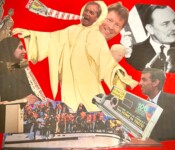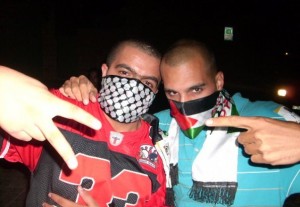Alternative Issue: Palestinian Hip-Hop a Product of its Environment
Out of great hardship comes great art. From the heart of a Palestinian refugee camp in the West Bank, a defiant voice is crying for freedom and justice.
In the narrow alleyways of Dheisheh refugee camp in Bethlehem, a Palestinian Hip Hop band was born in 2007. Three young rappers who were born and raised in a refugee camp felt fed up with being voiceless and quiet. They decided to sing about their life, their struggle and about the ongoing Palestinian-Israeli conflict. Their lyrics are strong and often aggressive in describing a harsh reality under occupation these three MCs are still living. Their songs are mostly in Arabic but they also sing in English and other languages in attempt to deliver their messages to a bigger audience.
In an interview via Skype with Palestine Street Band from their small studio in the Dheisheh camp, Diya Ibrahim, 22, a rapper, said that the band was formed in 2007 with the help of a grassroots centre in the camp. “At the beginning we couldn’t record our songs due to the economical situation and lack of professional equipments,” he said.
Despite all the difficulties these young MCs had, they managed to record their first album and had their first concert in 2007. Diya said: “We succeeded to present ourselves as rappers and to identify hip-hop to our people in the camp as an art.”
“Rap for us is an art that is no less important than poetry and literature,” Diya said.
In a relatively conservative society, being a hip-hop singer might not be seen as a good thing. Mohammad Azmi, 22, a Pal St. rapper said: “We had different reactions after our first performance; some liked it and accepted it as a way to tackle social and political issue, where others considered it as disrespectful for the culture, which is for me a baseless claim.”
“We knew since the beginning that we will face some of those problems, but we have been eager to change those people’s ideas and stereotypes,” he said.
Palestine Street has released more than 50 songs and they are now working on a new album to be released next summer.
During the Israeli attack on the Gaza Strip in 2008/2009, Palestine Street recorded a song called “We are all Gaza”. The song highlighted the suffering of the Palestinians Gaza during the war. Soud, 22, the band’s beat-boxer said: “We greatly succeeded in getting positive receptions by expressing the Palestinians suffering and agony in general.”
The band also participated in “Hip-Hop for Gaza” tour in 2009, which was aimed at fundraising for the people of Gaza. “This was just small thing we could do to help our people in Gaza. This tour helped us as a band in delivering our messages and in becoming locally and internationally known,” Soud said.
The tour included Palestinian and international rappers and singers such as the Palestinian DAM rap group with Sameh Zakot and Danish rappers Zaki and Waheed.

























